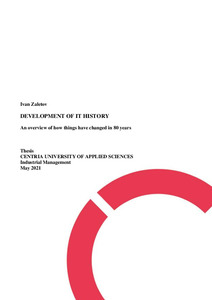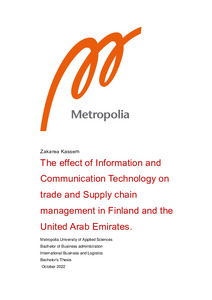Video Assistant Referees (VAR) : the technological impact on modern football
Al Izzawi, Omar (2025)
Al Izzawi, Omar
2025
All rights reserved. This publication is copyrighted. You may download, display and print it for Your own personal use. Commercial use is prohibited.
Julkaisun pysyvä osoite on
https://urn.fi/URN:NBN:fi:amk-202503164336
https://urn.fi/URN:NBN:fi:amk-202503164336
Tiivistelmä
Information technology and technology have had an important impact on sports, especially in football. As one of the most popular sports in the world, its legitimacy is strongly reliant on precise and fair officiating. The use of Video Assistant Referee (VAR) technology is intended to improve decision-making accuracy by assisting referees with real-time video replays. This thesis explores the impact of VAR technology on football officiating, specifically how it has improved decision-making processes, influenced game dynamics, and the sport's general integrity.
The research takes a comprehensive approach, combining theoretical analysis and data collection. It begins with a theoretical overview, delving into the history of referee technology, the concepts behind VAR, and the user experiences and interfaces. This foundation lays the basis for a more in-depth exploration of this topic through a literature review and practical analysis. The literature study focuses on VAR's influence on officiating, specifically the accuracy of decision-making before and after VAR. Preliminary studies have shown that VAR has increased decision-making accuracy in crucial match scenarios, but it also shows some concerns such as game flow disruptions and technological dependability challenges.
The thesis provides multiple perspectives on the actual implementation and usefulness of VAR technology through interviews with international referees and case studies of critical VAR decisions in major competitions. The study also compares VAR's implementation in football to similar technologies in other sports such as ice hockey, tennis, basketball, and rugby, analysing the process differences, advantages, and disadvantages in each sport. The data show that, while techniques vary, the main goal of improving decision-making and fairness has been improved across all the involved sports. The thesis also examines cost-effective alternatives, including solutions from Dartfish and slomo.tv, which show how smaller leagues can adopt VAR without sacrificing functionality or stretching up their budgets.
The study addresses the challenges of VAR implementation, such as expensive start-up costs, maintenance expenses, and the need to maintain the game's natural rhythm. Ethical issues and the social responsibilities concerning VAR decision-making are also discussed. Furthermore, this thesis explores VAR technology's social impact, considering how it affects fans, players, and football community.
Despite these challenges, the study analyses both the positives and downsides of VAR while offering suggestions for its optimal use to enhance football's fairness and integrity. The result of this study recommends steps like improving communication clarity, speeding up review processes, and finding a better balance between fairness and the sport’s natural rhythm.
The research takes a comprehensive approach, combining theoretical analysis and data collection. It begins with a theoretical overview, delving into the history of referee technology, the concepts behind VAR, and the user experiences and interfaces. This foundation lays the basis for a more in-depth exploration of this topic through a literature review and practical analysis. The literature study focuses on VAR's influence on officiating, specifically the accuracy of decision-making before and after VAR. Preliminary studies have shown that VAR has increased decision-making accuracy in crucial match scenarios, but it also shows some concerns such as game flow disruptions and technological dependability challenges.
The thesis provides multiple perspectives on the actual implementation and usefulness of VAR technology through interviews with international referees and case studies of critical VAR decisions in major competitions. The study also compares VAR's implementation in football to similar technologies in other sports such as ice hockey, tennis, basketball, and rugby, analysing the process differences, advantages, and disadvantages in each sport. The data show that, while techniques vary, the main goal of improving decision-making and fairness has been improved across all the involved sports. The thesis also examines cost-effective alternatives, including solutions from Dartfish and slomo.tv, which show how smaller leagues can adopt VAR without sacrificing functionality or stretching up their budgets.
The study addresses the challenges of VAR implementation, such as expensive start-up costs, maintenance expenses, and the need to maintain the game's natural rhythm. Ethical issues and the social responsibilities concerning VAR decision-making are also discussed. Furthermore, this thesis explores VAR technology's social impact, considering how it affects fans, players, and football community.
Despite these challenges, the study analyses both the positives and downsides of VAR while offering suggestions for its optimal use to enhance football's fairness and integrity. The result of this study recommends steps like improving communication clarity, speeding up review processes, and finding a better balance between fairness and the sport’s natural rhythm.
Kokoelmat
Samankaltainen aineisto
Näytetään aineisto, joilla on samankaltaisia nimekkeitä, tekijöitä tai asiasanoja.
-
Development of IT history : An overview of how things have changed in 80 years
Zaletov, Ivan (2022)The aim of this thesis was to describe the moving trends in the Information Technology industry from the point of view of history. It is assessed by specialists that the nonstop movement of IT and science has simplified ... -
The Impact Of Modern Communication Technology on the Quality Of Life Among the Elderly
Kariuki, Josphat Muiruri (2018)Adoption of communication devices and technologies among elderly people has been on the increase in recent past. These devices and technologies can be put to better use to enhance elderly’s QOL. This research project aimed ... -
The effect of Information and Communication Technology on trade and Supply chain management in Finland and the United Arab Emirates
Kassem, Zakarea (2022)ICT has had a significant impact on supply chain management in Finland and UAE, but there remain several challenges, including implementation costs, technical literacy and skill deficiencies, security concerns, and the ...



